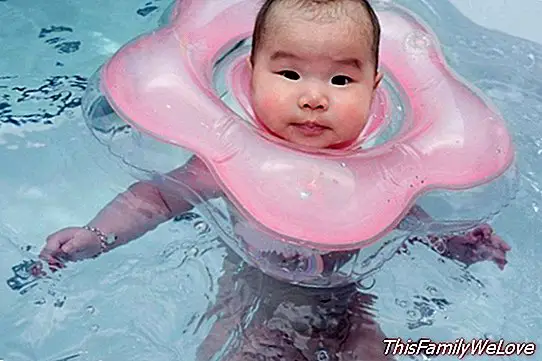Pediatricians warn of the dangers of neck floats

A summer in family is synonymous with great memories. There are many activities that can be done together, including visits to beaches, pools or lakes where you can enjoy a refreshing swim. The elderly who know how to defend themselves in this environment have it easy not to fall victim to accidents because they do not know how to swim, but the younger ones have to make use of Security elements.
The floats They are one of the items that most accompany families during their summer trips to all these locations. Some products that prevent the risk of submerging in these environments without security elements, proof of this are the 70 to 150 children who die every year in the water. However, not all floats are recommended as such and warned by the Spanish Association of Pediatrics, AEP.
Security and supervision
The first thing parents should keep in mind is that when infants or young children are in or around water they should be within reach and supervised by an experienced adult. By what is surveillance be adequate, the distance to the child should be less than the length of the caregiver's arm, that is to say, it must be within reach.
The simple use of floats or inflatable hoses are not effective protection. While these can be an element that allows contact with water to learn to swim, around 4 years. In recent times, floats have been marketed around the neck to be used by babies.
At present, there are no studies that show that the use of floaters in the neck produces any benefit in babies. On the one hand, the use of inflatable devices It can produce a wrong sense of security. The safest form of bathroom for babies is in the arms of an adult and always subject and supervised.
Publications such as the one made by STA Baby Swimming Tutor It indicates that using these floaters that keeps the neck upright can be counterproductive to development. Babies that are held vertically in the water with their heads supported by a semi-rigid structure, especially the smaller ones, may receive compression of their neck and strain their ligaments and muscles.
Water safety
From the American Association of Pediatrics the following are given security advice so that the little ones can enjoy the activities in the water:
- In places like beaches, parents should be aware of the waves that can knock children down and submerge them. In the case of swimming pools, attention should be paid to depth.
- Children who already swim, even in a shallow pool for small children, should always be observed by an adult, providing "supervision where they can grab" when infants or toddlers fall.
- Publicize safety rules and enforce them in the water.
- Do not allow children to use inflatable toys or mattresses as if they were life jackets.
- Adults should not consume alcoholic beverages when they swim. It presents a danger to them as well as to any children they may be supervising.
Damián Montero




